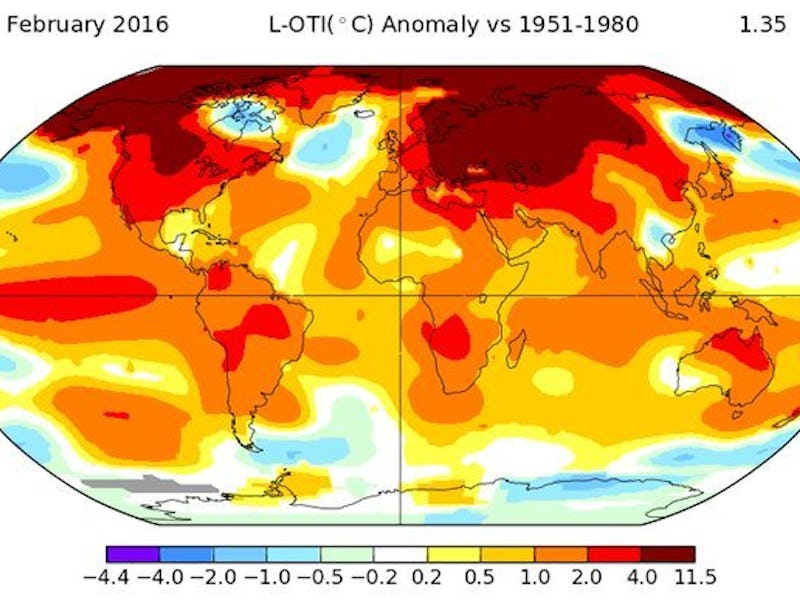February 2016 Shatters Monthly Warming Record In a Historic Way
It's off the charts.

By now, we’re all used to annual reports that declare the past year was the hottest one on record, so individual months couldn’t possibly tell us anything new. And climate scientists generally agree: The temperature of an individual month or even a year tends to reflect weather, not climate. But even typically chill climate scientists were freaking out at how badly February broke all historical temperature records.
“We are in a kind of climate emergency now,” Professor Stefan Rahmstorf of the Potsdam Institute of Climate Impact Research in Germany, told Fairfax Media. “This is really quite stunning … it’s completely unprecedented.”
That’s not to say we haven’t been in a climate emergency until now, but February was something different altogether. February 2016 was 1.35 degrees Celsius warmer than the average February from 1951-1980. January 2016 previously held the record for largest deviation — 1.15 degrees warmer than historic Januaries.
The 18 percent increase in the single month record has shocked scientists around the world. It will also challenge policymakers who only a few months ago, committed to “pursue efforts” to avoid 1.5 degrees of warming at the Paris climate talks. The two degree “danger limit” of warming established in the Paris agreement is now staring us in the face.
With the hottest January and February on record, 2016 is well on its way to becoming the warmest year in history, just like 2015 and 2014 before it. The UK Met Office has already called the race for 2016, meaning three years of successive records, which look even worse over time.
It’s unsurprising that we are posting new warmest records all the time, but even those who deny climate change should take heed to the reactions to the February report. It’s hard to know yet whether warming is actually accelerating beyond current forecasts, but it certainly seems possible. Even if some of the major global economies are slowing down, we’ve never even had a really good sense of the carbon emissions of countries like China and India, which have driven manufacturing growth over the last two decades. It’s entirely possible that we’ve been emitting more carbon than we thought, and scientists are just feeling those effects now.
Professor Gavin Schmidt is the Director of NASA’s Goddard Institute for Space Studies, one of the three major record keepers for climate. He is as well versed in the current understanding of climate change as anyone, and this report made him say, “Wow.”
That’s not a good sign.